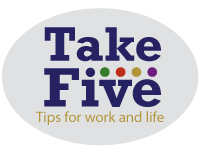Take Five: Beat Unhealthy Afternoon Food Cravings
Tips on eating what's best for your body and boosting energy levels

For many, the workday afternoon is the ideal time for snacking, with office vending machines or candy stashes not far from reach. But daily food cravings aren't a sign of weakness - it's simply a way our body tells us we need food for fuel, said Kelly Gehle, a registered dietitian and nutrition manager with LIVE FOR LIFE, Duke's employee wellness program.
Gehle noted that people shouldn't view hunger as a bad thing.
"All the diet pill, supplement and quick weight loss companies out there make us feel like hunger is abnormal," she said. "The only problem is that some of us confuse hunger with appetite or craving and that's when overeating or unhealthy eating happens."
Use these tips to make healthy choices when those afternoon cravings roll around:
1. Start the day right
To avoid overeating later in the day, Gehle said it's important to eat a healthy breakfast. She recommends foods that include whole grains, lean protein and a little healthy fat like walnuts or almonds tossed in oatmeal. Low-fat, plain yogurt is another popular choice to add protein to breakfast.

Much like breakfast, Gehle said a midday meal should also feature several aspects to help you feel full and keep energy levels up. "You want to make sure you have a healthy carbohydrate like whole grains, lean protein like skinless chicken, turkey or beans, and again a small amount of healthy fats," she said.
3. Set a schedule
Keeping a full stomach and energy levels high is easy for Nakia Hawley, a staff assistant in the Department of Ophthalmology.
"I put myself on a two-hour schedule, so I start with breakfast, two hours later eat a snack, two hours later have lunch, two hours later have a snack and two hours later have dinner," Hawley said. "I always carry a lunch pack wherever I go, so I know I won't be snacking on things that aren't nutritious."
4. Understand your hunger
Cravings typically happen in the afternoon because blood sugar levels drop as more time passes from lunch. A decrease in blood sugar levels can increase the need to eat to get a rise in energy. Gehle said snacking is perfectly normal, so simply be aware of how your body feels and keep drinking water - even slight dehydration can cause fatigue.
5. Go ahead, snack. But be responsible
Gehle said it's wise to avoid sugary snacks - like candy bars or cookies - that satisfy a body's craving for higher blood sugar levels, but don't offer nutrients to keep you feeling full and satisfied.
Hawley, who uses LIVE FOR LIFE programs like HealthCheck and Steps to Health to keep track of her weight and diet plan, said she's learned to focus on fiber and protein in her meal planning, which keeps her energy levels up. She'll often snack on combinations like strawberries and nuts, an apple and cheese or yogurt with different fruit.
"As long as you have food on-hand that you know will be good for you, you won't find yourself snacking on things that aren't nutritious and won't help your body make it through the day," she said.
For more tips on eating well and free Duke programs to maximize your diet, visit the LIVE FOR LIFE website.